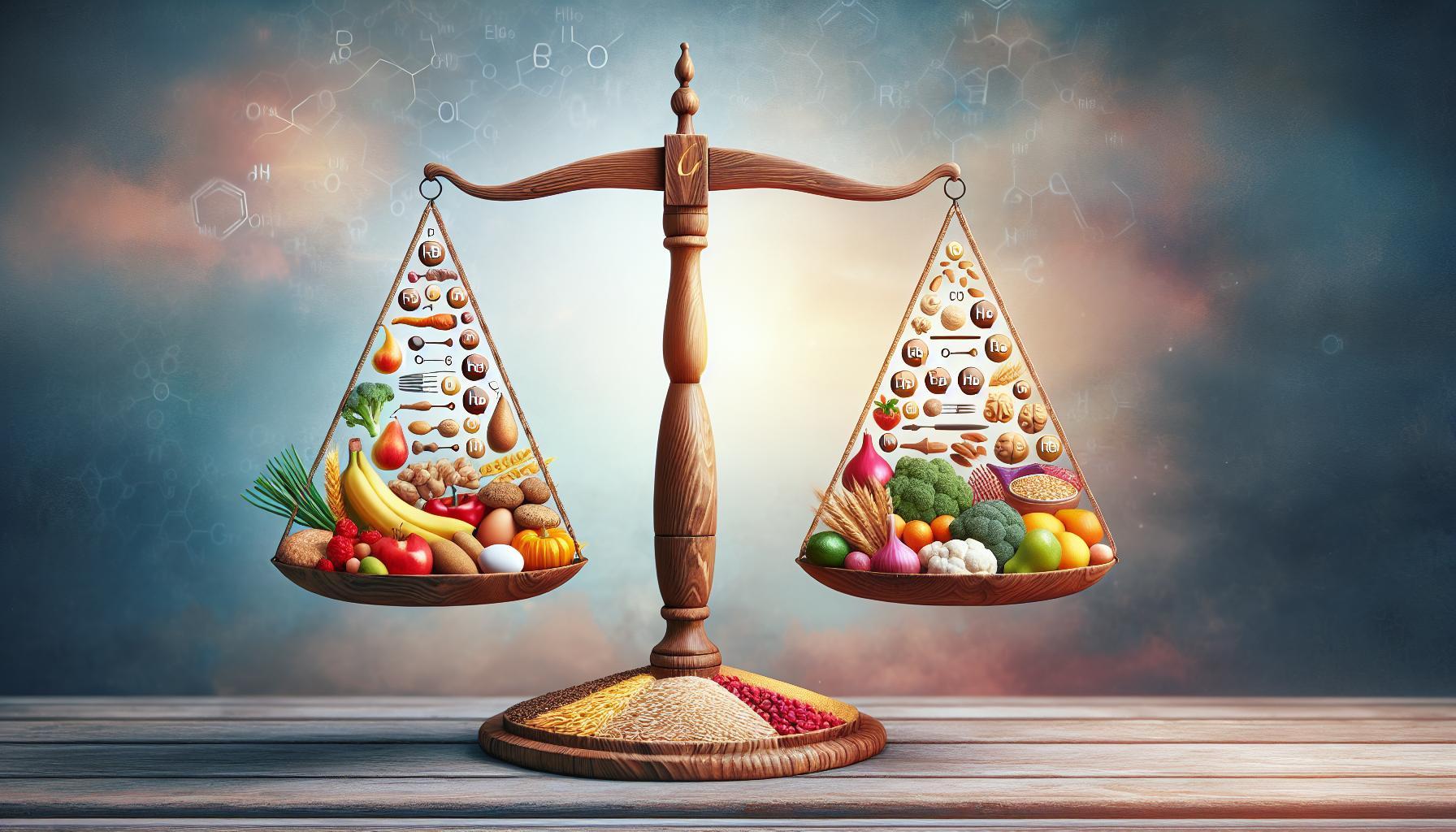Welcome to our comprehensive guide on “Nutrition for Hormonal Balance”. Harboring a harmonious dance of hormones in our bodies is crucial for optimal health. Many factors contribute to the balance of hormones, but nutrition plays a star role, often left unacknowledged. This post delves into that role, exploring how foods that promote estrogen balance, the impact of dietary fats on hormones, and the Role of Fiber in Hormonal Health. You’ll understand how to better approach your meals and food choices not just for weight management or gut health but for a holistic, well-rounded hormonal balance.
Understanding Hormonal Imbalances
Hormones effectively act as chemical messengers, coordinating bodily functions such as reproduction, metabolism, and mood. However, factors like stress, inadequate sleep, and poor nutrition can disrupt this complex system, triggering hormonal imbalances. Such imbalances often manifest in the form of weight fluctuations, mood swings, fatigue, and irregular periods. Therefore, nutrition for hormonal balance becomes essential in managing such symptoms and promoting overall health.
The Double-edged Sword of Stress Hormones
Stress is a rampant hormonal disruptor. The persistent release of stress hormones like cortisol can wreak havoc on your body’s hormonal equilibrium. Hence, including stress-busting foods like dark chocolate and green tea in your nutrition plan can strike a balance in the stress hormone levels.
Dietary Fats and Hormones
When you think of dietary fats, the first thing that comes to mind is likely weight gain and heart disease. However, dietary fats are vital for hormone production. Among these, saturated fats, omega-3 fatty acids, and monounsaturated fats are the key ones. When incorporated judiciously into your diet, these fats can promote hormonal balance, mood stability, and cognitive function.
The Omega-3 Factor
Omega-3 fatty acids, found abundantly in fish, walnuts, and flaxseeds, can help counter inflammation and support the body’s hormonal structure. A diet rich in omega-3s can thus enhance your overall hormone health, making them key to nutrition for hormonal balance.
The Mighty Fibers for Hormonal Balance
Fiber plays a significant role in maintaining hormonal health by aiding digestion and balancing blood sugar levels. A fiber-rich diet can lead to sustained energy levels, improved mood stability, and successful weight management due to its impacts on hormones like insulin and ghrelin.
Soluble Fiber for Insulin Sensitivity
Soluble fiber, found in oats, legumes, and berries, can improve insulin sensitivity and thus, reduce the risk of developing type 2 diabetes. This is yet another instance where a strategic nutritional choice can influence hormonal balance.
Identified Foods that Promote Estrogen Balance
Estrogen, the quintessential female hormone, is responsible for reproductive health and mood. Imbalance in estrogen levels has been associated with conditions like Polycystic Ovary Syndrome (PCOS) and menopausal symptoms. Consuming phytoestrogen-containing foods such as soy, flaxseeds, and tofu can help maintain estrogen balance.
The Phytoestrogen Curiosity
Phytoestrogens, plant-derived compounds that mimic estrogen, can help balance estrogen levels. Though certain controversies surround phytoestrogens, their moderate, consistent consumption can contribute toward balanced estrogen levels.
The Case for Regular Exercise
Alongside nutrition, consistent physical activity has a hand in maintaining hormonal balance. Exercise has been shown to regulate insulin levels, reduce stress, and promote better sleep, all playing a role in hormone regulation.
The Exercise-Endorphin Connection
Regular exercise triggers the release of endorphins—hormones that act as natural painkillers and mood elevators. Thus, to achieve better hormonal balance, it’s beneficial to incorporate regular exercise into your lifestyle.
Importance of Hydration
Staying hydrated is essential for nearly all bodily functions, including hormone regulation. Dehydration can affect the production and function of hormones. Drinking an adequate amount of water daily should, therefore, be a non-negotiable part of your routine for nutrition for hormonal balance.
Water: The Unsung Hero
While the significance of water might seem overplayed, it is necessary for optimal body functions. Dehydration throws off vasopressin (antidiuretic hormone) levels, disrupting other hormones in its wake.
Conclusion
We’ve explored various facets of how nutrition plays a crucial role in hormonal balance—be it through understanding hormonal imbalances, the importance of dietary fats, fibers, specific food types for estrogen balance, the role of exercise, or hydration. By making mindful meal choices and embracing a balanced lifestyle, we can strive towards achieving optimal hormonal health. Remember, ‘Nutrition for Hormonal Balance’ is not just a health nuance; it’s a key tenet for maintaining overall well-being.
Frequently Asked Questions
What foods are beneficial for hormonal balance?
Foods rich in healthy fats, fiber, and phytonutrients, such as avocados, flaxseeds, leafy greens, and nuts, are beneficial for maintaining hormonal balance.
How does lack of sleep affect hormonal balance?
Lack of sleep disrupts the production of crucial hormones like cortisol and insulin, leading to imbalances that can affect metabolism, stress levels, and overall health.
Can exercise help regulate hormonal balance?
Yes, regular exercise helps regulate hormonal balance by reducing stress hormones, improving insulin sensitivity, and promoting the release of endorphins and other beneficial hormones.
What role does dehydration play in hormonal balance?
Dehydration can disrupt hormone production and function, particularly affecting cortisol levels, which can lead to increased stress and imbalances in other hormones.
What dietary habits contribute to hormonal balance?
Eating a balanced diet rich in whole foods, reducing sugar intake, incorporating healthy fats, and maintaining regular meal times contribute to optimal hormonal balance.










